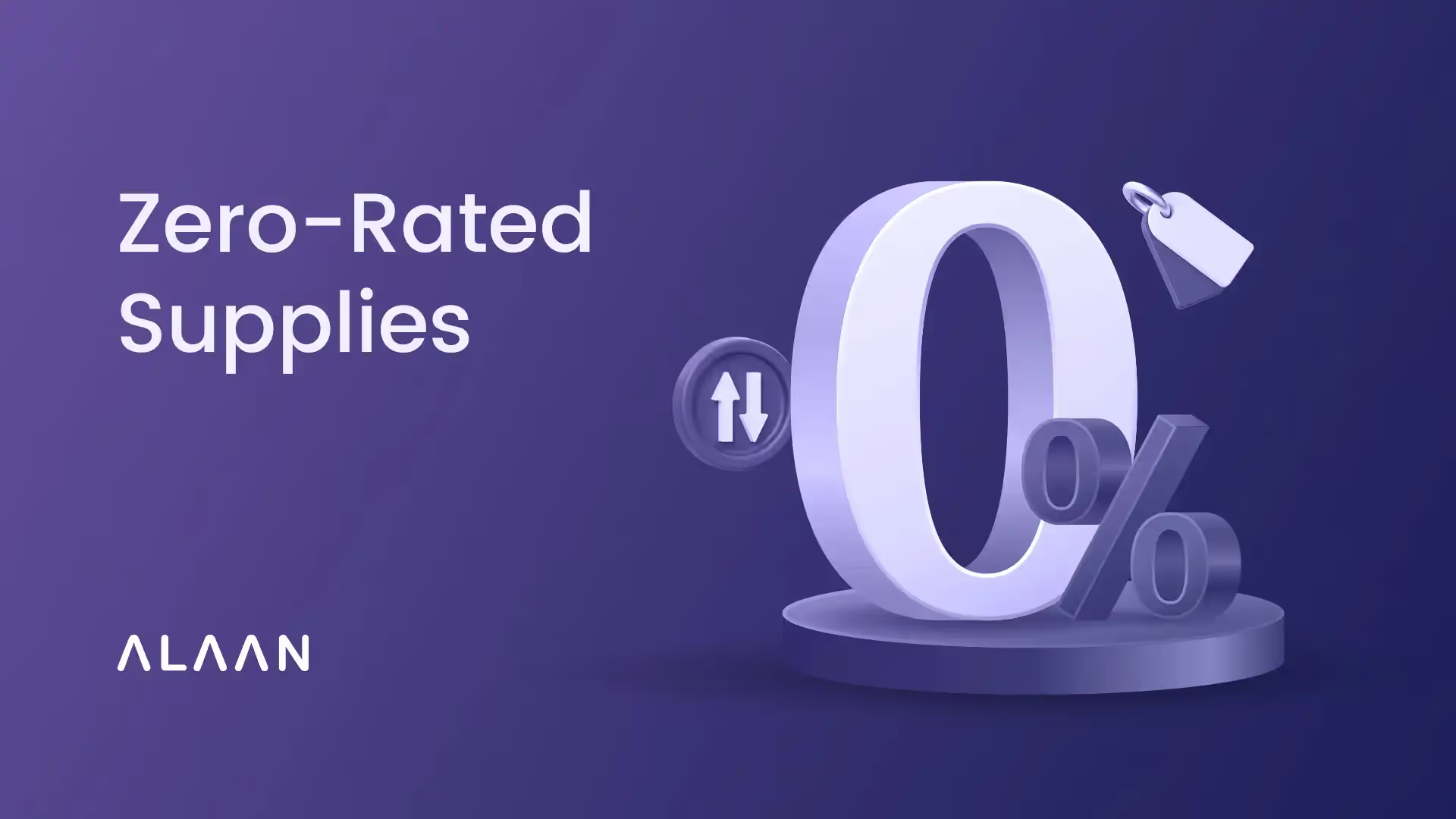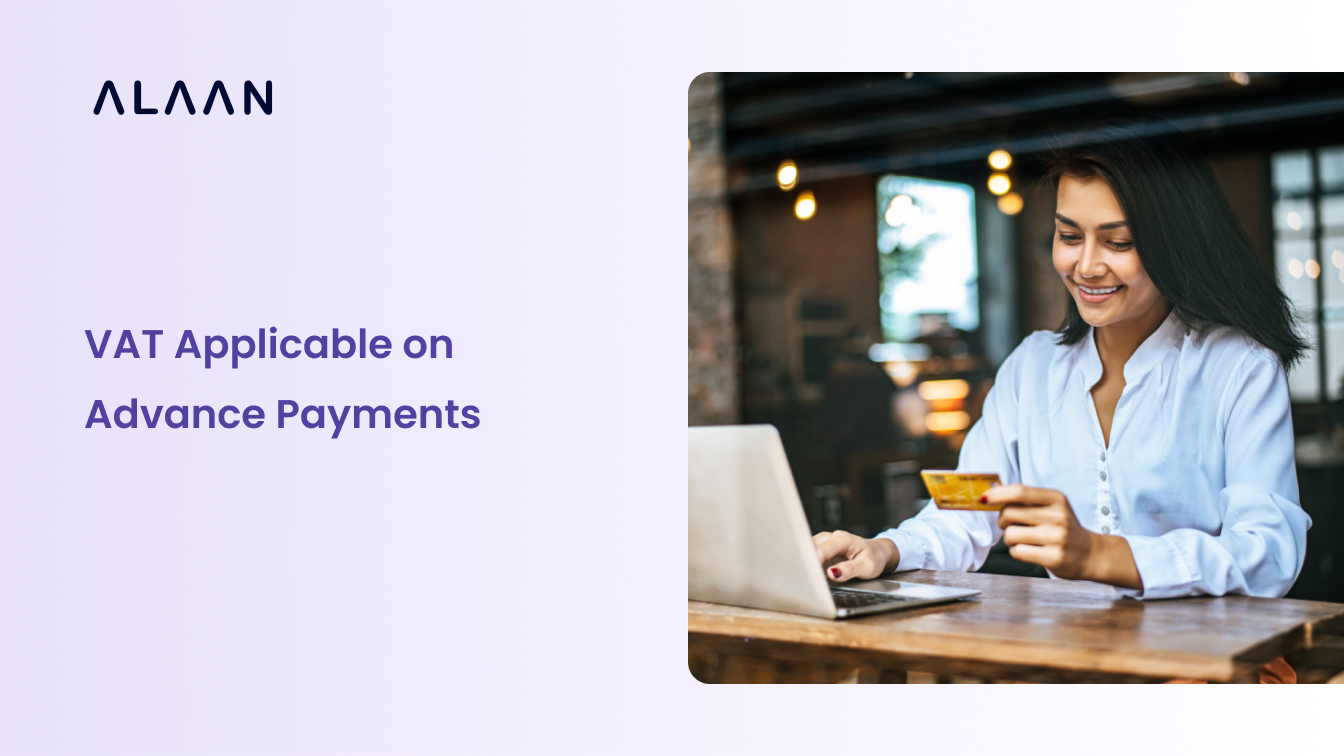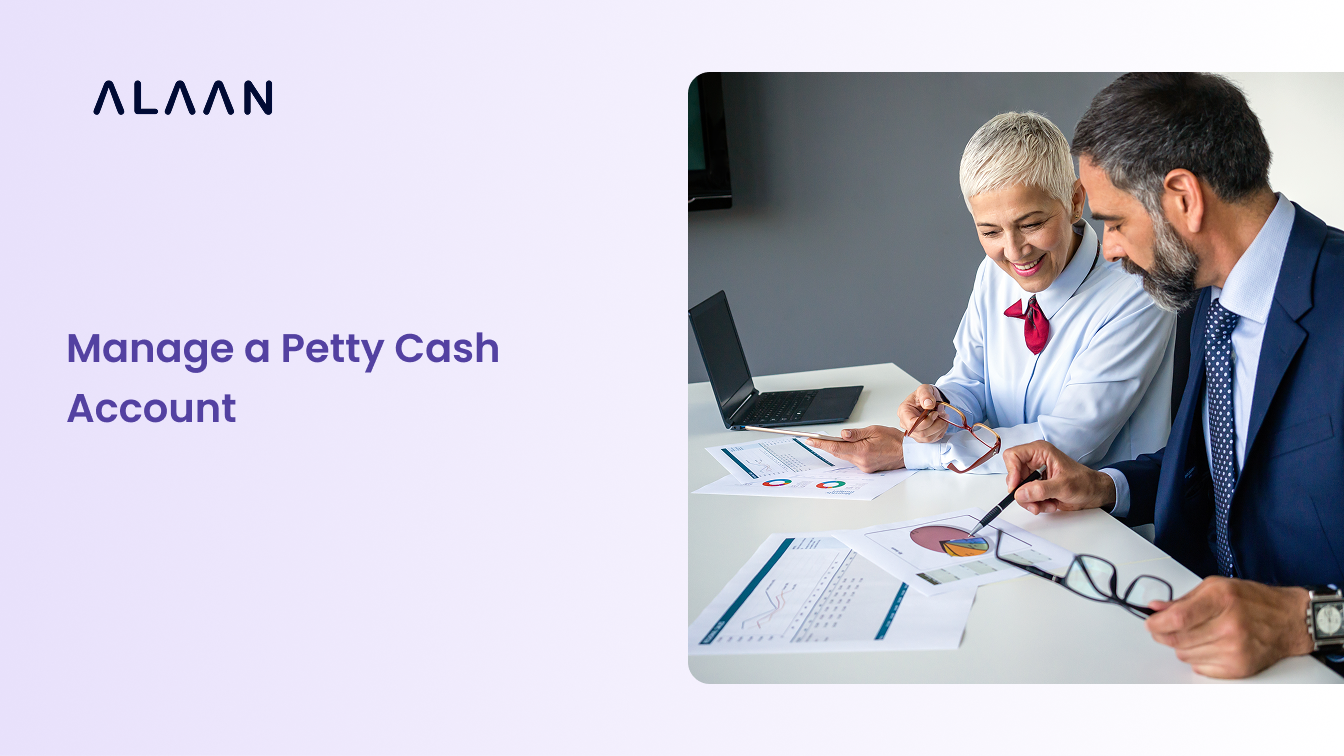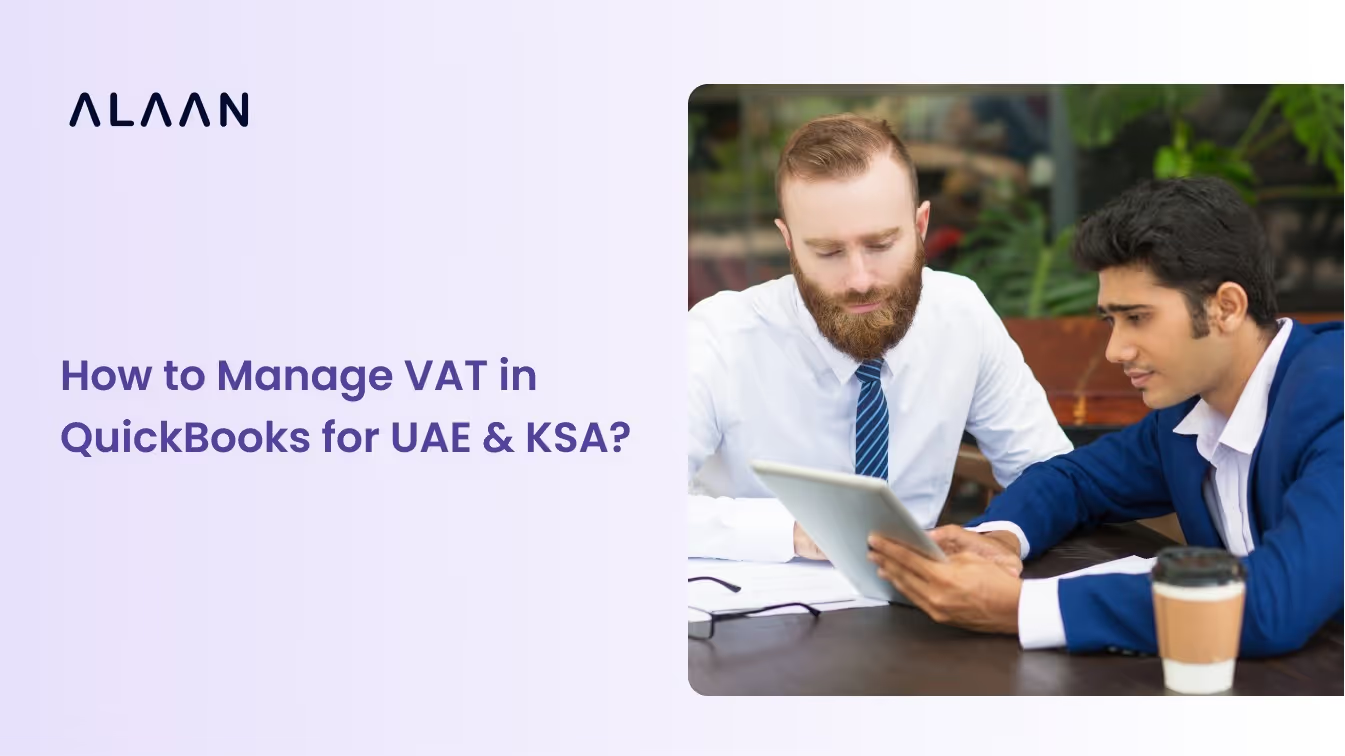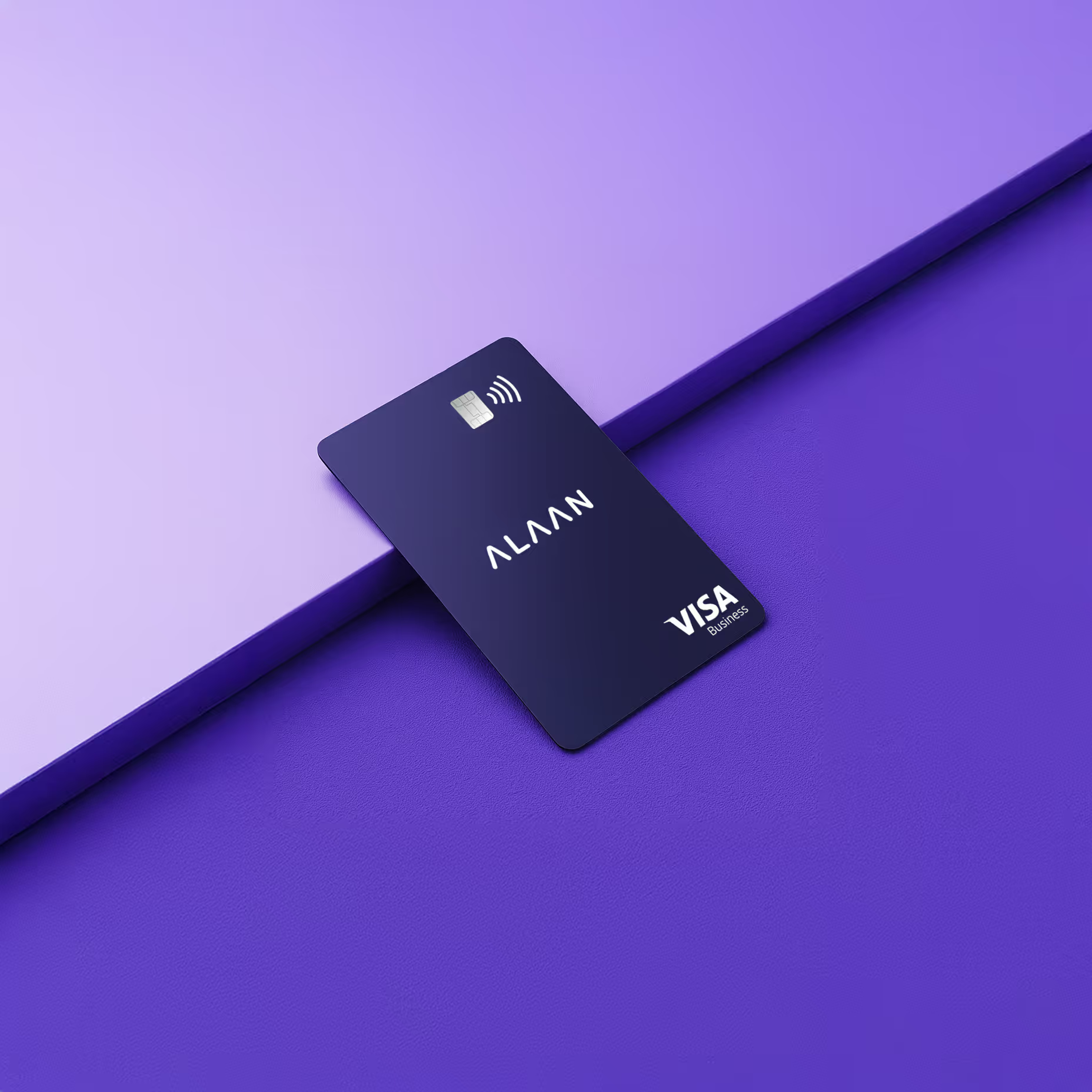Have you ever felt like the world of taxes speaks a whole different language? You're not alone. Things can get a bit confusing, especially when it comes to VAT (Value Added Tax). But don’t worry – we have a handy guide to help you with your VAT process.
In this article, we will discuss the concepts of exempt and zero-rated supplies in the UAE. We will also examine their impact on VAT reporting, the significance of Form VAT201, and how understanding VAT can contribute to your business’s financial strategy.

What is the VAT rule in the UAE?
In the UAE, VAT is applicable at a standard rating of 5% tax. It is an indirect tax applicable on the supply of most goods and services, including imports.
As a VAT-registered business, you must collect the tax on outward supplies (sales). You need to transfer this amount to the Federal Tax Authority (FTA) after deducting the VAT paid on your inward supplies (purchases).
Here is an example to help you better understand the VAT rules in the UAE.
Suppose you are running a furniture business and buy wood for AED 1000. The VAT on this purchase is AED 50 (5% of AED 1,000). You manufacture a table and sell it for AED 2,000. The VAT on this sale is AED 100 (5% of AED 2,000).
As a VAT-registered business, you collect AED 100 from your customer, but you have already paid AED 50 as VAT on your raw materials. So, you deduct this AED 50 from the AED 100 collected; the remaining AED 50 is what you remit to the FTA.
Understanding UAE VAT Law can help you maintain FTA compliance and ensure accurate financial reporting to avoid possible penalties or fines. UAE VAT Law also specifies exempt and zero-rated supplies that must be handled differently than the standard VAT—more details on this will be provided in our following sections.

What are zero-rated supplies in the UAE
As per the UAE VAT rules, zero-rated supplies in the UAE are goods or services that are subject to VAT but at a rate of 0%. Simply put,
- You don't collect any VAT from your customers on these supplies.
- You can claim the input tax credit for any VAT you paid on expenses related to those supplies.
Think of it like this: you are providing a service, but the government says, "hey, this one's important, keep the tax money you paid for supplies." This can be a significant cost-saver for businesses that deal in zero-rated supplies.

Here are the zero-rated supplies mentioned in the UAE VAT Law:
- Export of services and goods outside the GCC: Export of goods and services outside the GCC (Gulf Cooperation Council) are taxed at 0%.
- International transportation services: International transport services for passengers or goods are subject to a zero VAT rate. This includes related supplies like pallets, crates, safety equipment, etc.
- Specific means of transport: The sale or lease of trains, trams, vessels, and aeroplanes qualify as zero-rated supplies in the UAE.
- Precious metals: Import of precious metals like silver, gold, and platinum is taxable at 0%. The metal purity must be 99 per cent or more, and it should be in a form that is tradable in global bullion markets.
- Residential buildings: The first sale or rent of residential buildings intended and designed for human use is zero-rated.
- Charity-related buildings: Buildings specifically designed to be used by charities also qualify as zero-rated supplies in the UAE.
- Certain educational services: Some educational services and related goods and services are zero-rated under the UAE VAT rules. These include,
- Nursery, preschool, and school education.
- Higher education by institutions that are either owned by the government or funded by more than 50% of the government.
The educational institution must be recognised by the competent federal or local government and follow the government-approved curriculum. Only the core educational services and directly related goods and services qualify for zero-rated VAT. Any educational services offered by entities other than those mentioned above will be charged at a 5% standard rate.
- Specific healthcare services: The following healthcare services and related goods and services qualify for zero VAT.
- Curative and preventive healthcare services, including treatments, diagnoses, consultations, and procedures performed by licensed medical professionals.
- Services provided by hospitals and clinics (government and private). This also includes licensed medical practitioners (doctors, nurses, dentists, etc.) authorised by the Ministry Of Health And Prevention (MOHAP) or other relevant authorities.
- Certain medical equipment and medication can also be zero-rated when included in a list approved by the UAE Cabinet and supplied specifically for use in combination with zero-rated healthcare services.
Criteria for zero-rated VAT treatment:
- The healthcare service must be generally accepted in the medical field as necessary for the patient's treatment, including preventive measures.
- The good or service must be directly linked to the zero-rated healthcare service. For example, if a specific medication is crucial for a treatment covered under zero-rated VAT, the medication itself might also be zero-rated.
Services like cosmetic treatments or those not directly related to medical care typically don't qualify for zero-rated VAT and are subject to a 5% standard VAT rate.
What are exempt supplies?
Exempt supplies are certain goods and services on which VAT is not charged at the time of the supply. Unlike zero-rated supplies, if you supply exempt goods or services, you cannot recover any tax incurred on the related expenses. Knowing what qualifies as exempt supplies might help you manage your VAT accounting effectively.

Here are the exempt supplies specified under the UAE VAT law:
- Bare land: The supply of bare land enjoys VAT exemption in the UAE. If you deal with the sale of vacant land, you cannot levy any tax on these transactions.
- Financial services: Some financial services that do not involve direct payment are exempt from VAT. The payment could be in the form of fees, commissions, discounts, rebates, or similar compensations. This exemption also applies to services such as life insurance and life reinsurance.
- Local transport services: If you supply local passenger transport services within the UAE, then these transactions are exempt from VAT. This rule applies to businesses operating taxis, buses, trains, or ferries.
- Lease or rent of residential properties: Residential buildings other than those specifically zero-rated are exempt from VAT. This means if you are in the business of selling or renting residential properties, you need not charge any tax.
Non-recoverable input tax
The term ‘non-recoverable input tax’ refers to the VAT that your company incurs on certain purchases and expenses but may not claim any input credit for it. You cannot deduct this VAT amount when calculating your net VAT payable. Here are the different expense categories where it is not possible to claim input VAT credit:
- Entertainment services Provided to non-employees: If you treat clients, potential customers, or shareholders to entertainment, the VAT incurred here is not recoverable. This applies to meals, events, or any activity considered entertainment as per the VAT rules.
- Business vehicle usage: If your business owns or leases vehicles that are available for private use by anyone (including employees), the VAT on these expenses is generally not recoverable. However, if the vehicle is used exclusively for business purposes, you can recover the VAT, subject to certain conditions.
- Goods or services purchased for employees: If you purchase any goods or services for employees’ personal use (beyond what is required for employment), the VAT incurred on these expenses is not recoverable. Such expenses include perks like staff outings, gifts, and club memberships.
Understanding VAT declaration (Form VAT201)
The VAT Declaration (Form VAT201) is a crucial part of your VAT compliance in the UAE. It is a document you submit to the FTA detailing your VAT activity for a specific period. Filing this form accurately and timely can help you avoid any possible penalties and ensure smooth tax operations.
You can follow these steps to access Form VAT201:
- Visit the FTA’s e-Services portal and log in to your account. If you do not have an account, complete the registration for a new account first.
- Once logged in, you can find the form under the ‘VAT’ tab.
- Select ‘VAT201 - VAT Return’ to start the process.
- Filling out Form VAT201 requires careful attention. Depending on the nature of business activities, you may be required to provide the following details:
- Your Tax Registration Number (TRN)
- The reporting period (usually quarterly)
- Details of your taxable supplies and their value (excluding VAT)
- Details of zero-rated supplies and exempt supplies (if applicable)
- Details of your expenses and the amount of input tax you can claim
- By accurately reporting these figures, you can ensure that you pay only the net amount of VAT due.
Try to maintain organised financial records throughout the reporting period to streamline the filing process for Form VAT201. Expense management software like Alaan can automate the process of maintaining and organising your financial records, making it easier to report figures for Form VAT201 accurately. Alaan also helps you track and categorise expenses, ensuring that the input tax claim is accurate and that only the net amount of VAT due is paid.
Do businesses have to register under VAT UAE if they fall under zero-rated supplies?
Even if your company mainly deals in zero-rated supplies in the UAE, you may still need to register for VAT, as the registration criterion is based on the taxable turnover of the business.
If the taxable turnover of your enterprise exceeds AED 375,000 in a 12-month period, it is advisable to register for VAT within 30 days of crossing the specified threshold. In this context, taxable turnover refers to both standard (5%) and zero-rated supplies (0%). Therefore, it is recommended that you keep track of your taxable turnover regularly and register for VAT as necessary.
Exception for Solely Zero-Rated Supplies
There is a potential exception to the above rule. Suppose your business deals only in zero-rated supplies (such as airlines, hospitals, exports, etc.) and makes no standard VAT-rated supplies. In that case, you can apply for a VAT registration exemption. However, it shall be subject to the following conditions:
- This exemption needs to be approved by the FTA.
- With this exemption, you need not submit regular VAT returns.
- You shall not be able to recover any input tax paid on business purchases.
Impact of exempt and zero-rated supplies on businesses

Understanding how exempt and zero-rated supplies impact your business can play an important role in VAT compliance and financial planning. Here is an analysis of the key aspects:
VAT registration
The choice to register for VAT is influenced by the type of supplies you provide.
- Exempt Supplies: As per the rules, if your enterprise deals only in exempt supplies, then you need not register for VAT.
- Zero-Rated Supplies: On the other hand, if your enterprise exceeds the AED 375,000 taxable turnover threshold (including zero-rated supplies), you must register for VAT. You can consider registering for VAT if your turnover crosses the voluntary registration threshold of AED 187,500 during the tax period.
While you do not charge any VAT on the sales, you can claim input tax credit on qualifying business expenses. This could lead to significant cost savings and boost your profits.
Filing returns
Even with exempt or zero-rated supplies, VAT filing requirements still apply. Here is the key difference:
- Exempt Supplies: You need to report the value of your exempt supplies in the VAT return. However, you cannot claim any input tax related to those supplies.
- Zero-Rated Supplies: You must report the value of zero-rated supplies in your VAT return. You are eligible to claim input tax credit on qualifying expenses related to those zero-rated supplies.
Financial management
The impact on your finances depends on the type of supplies:
- Exempt Supplies: As you cannot claim input tax on exempt supplies, your overall costs might be higher compared to zero-rated supplies. The VAT you pay on business expenses is an added cost that cannot be recovered through VAT returns.
- Zero-Rated Supplies: The ability to claim input tax on zero-rated supplies can be a significant financial benefit. You may recover the VAT paid on expenses incurred while providing those supplies. This can lead to cost reduction and potentially better profit margins.
Conclusion
Well, this is all we have for today. To summarise quickly, VAT is applied to most goods and services sold within the UAE. But there are some exceptions – exempt supplies and zero-rated supplies. Understanding the difference between these two can save you a VAT headache (and maybe even some money!).
As a business, it is beneficial to have a tool that simplifies finance and helps you calculate accurate taxes. This is where an expense management platform helps!
Alaan is a trusted expense management platform that can simplify your business spend management and assist you with VAT compliance. Alaan
- Automatically identifies zero-rated and exempt supplies to ensure accurate VAT reporting.
- Keeps a clear record of input tax so that you can claim input tax on zero-rated supplies.
- Automates VAT calculations and streamlines related workflows like data collection and validation.
Explore how Alaan can be your partner in the journey towards effective VAT management. Book a demo today.


.avif)


